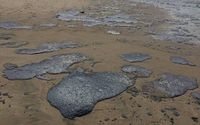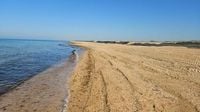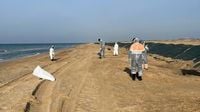The coastal areas of Anapa and the Temryuk district have been declared unsuitable for summer recreation, according to a statement from Anna Popova, the head of Rospotrebnadzor. This announcement comes in light of recurring oil spills that have plagued the region, raising concerns about the safety of beachgoers this upcoming summer.
On April 18, 2025, it was reported that new oil spills were discovered along the Anapa coast, further complicating the situation. Teams from various cities and districts within the Krasnodar Territory conducted mandatory monitoring of the designated beach areas early that morning. Participants in the emergency response from the Labinsk region reported significant releases of petroleum products, particularly between the village of Vityazevo and Blagoveshchenskaya station.
Despite the dire warnings from health officials, local residents remain undeterred. Many have expressed their intention to swim in the sea regardless of the contamination risks. This defiance reflects a deep-rooted connection to the region's beaches, which are a central part of local culture and identity.
In her remarks, Popova emphasized that the beaches of Anapa and the Temryuk region do not meet the requirements for summer resort activities. She also noted that the coastal territory extending from Novorossiysk to the east is not currently contaminated with oil, and no further pollution is expected in that area. Meanwhile, the situation in Crimea and Sevastopol is reported to be significantly better.
Rospotrebnadzor has determined that the minor oil spills observed in Crimea, such as those recently reported in Kerch, do not significantly affect the condition of the beaches there. To ensure safety, Popova announced that reinforced monitoring would be implemented in the affected areas, with additional sampling to prevent any further complications.
The oil spills can be traced back to the destruction of the Volgoneft-212 and Volgoneft-239 tankers in the Kerch Strait on December 15, 2024. This incident released thousands of tons of fuel oil into the water, with Anapa and the Temryuk region bearing the brunt of the environmental disaster. Just 11 days after the tankers sank, a federal emergency was declared in the area.
As a response to the ongoing environmental crisis, local authorities are exploring alternative recreational options for tourists who may be deterred from swimming in the sea. Governor Veniamin Kondratiev announced plans for excursions, visits to wineries, and agro-tourism activities as substitutes for traditional beach outings.
In addition, the region is gearing up to host various gastronomic and sporting events to attract visitors. A unique exposition is set to open at the Anapa Museum, providing cultural enrichment alongside the alternative tourism options. Festivals are also in the works, aiming to draw attention to the region's rich heritage and vibrant community.
Efforts to clean up the affected beaches continue, with emergency response teams prioritizing the removal of new oil spills. As of now, approximately 459 kilometers of coastline have been cleaned, with nearly 156,800 tons of contaminated sand and soil collected. Over 111,600 tons of this waste have been transported to temporary storage sites. To enhance the cleanup efforts, additional specialized machines for sand cleaning have been dispatched to the beaches, with plans for more equipment to arrive in the future.
While the challenges posed by the oil spills are significant, the resilience of the local community shines through. Many residents are committed to enjoying the summer season, regardless of the warnings from health officials. "We will swim in the sea no matter what," stated one local resident, underscoring the deep-seated love for the coastal lifestyle.
As the summer approaches, the situation remains fluid. The ongoing monitoring and cleanup efforts will be crucial in determining the safety of the beaches for both locals and tourists. The stakes are high, not only for the environment but also for the local economy that heavily relies on tourism.
With the promise of alternative activities and the community's determination to embrace the summer, Anapa and the Temryuk district are bracing for a season that may look different from previous years. The hope is that with effective management and community engagement, the region can navigate these turbulent waters and emerge stronger.



